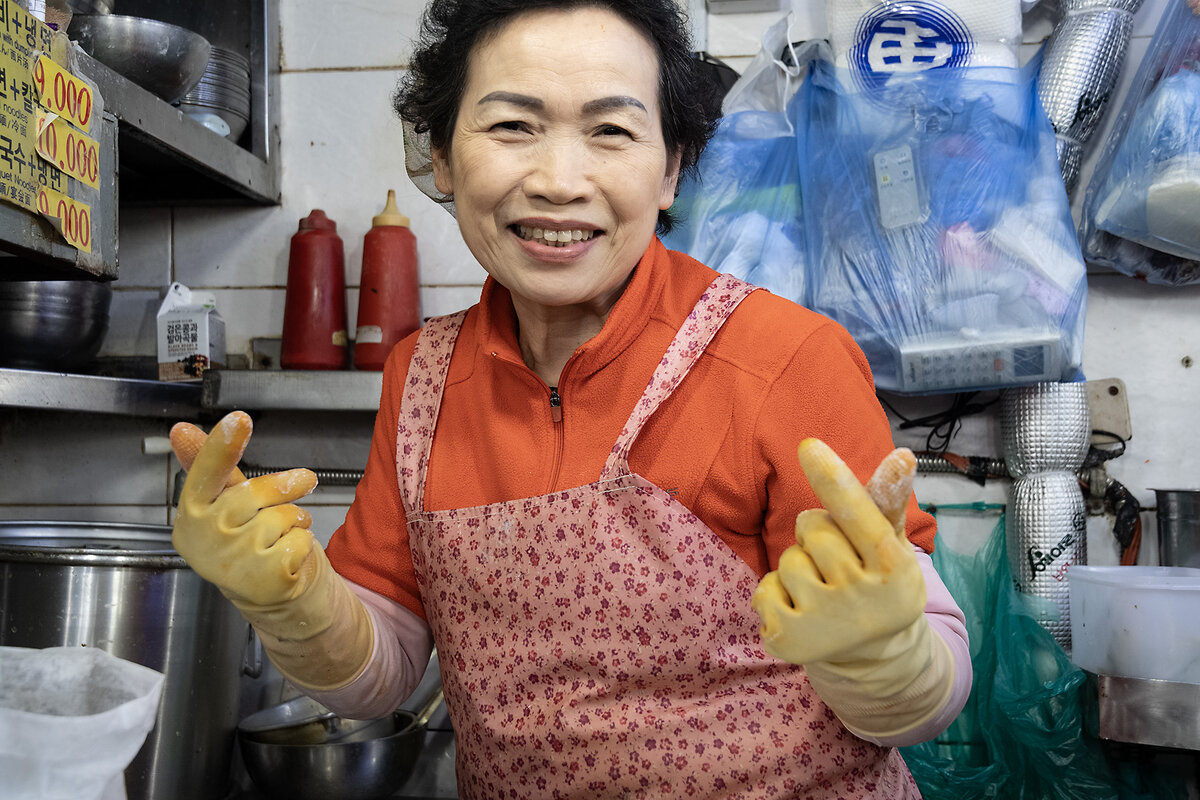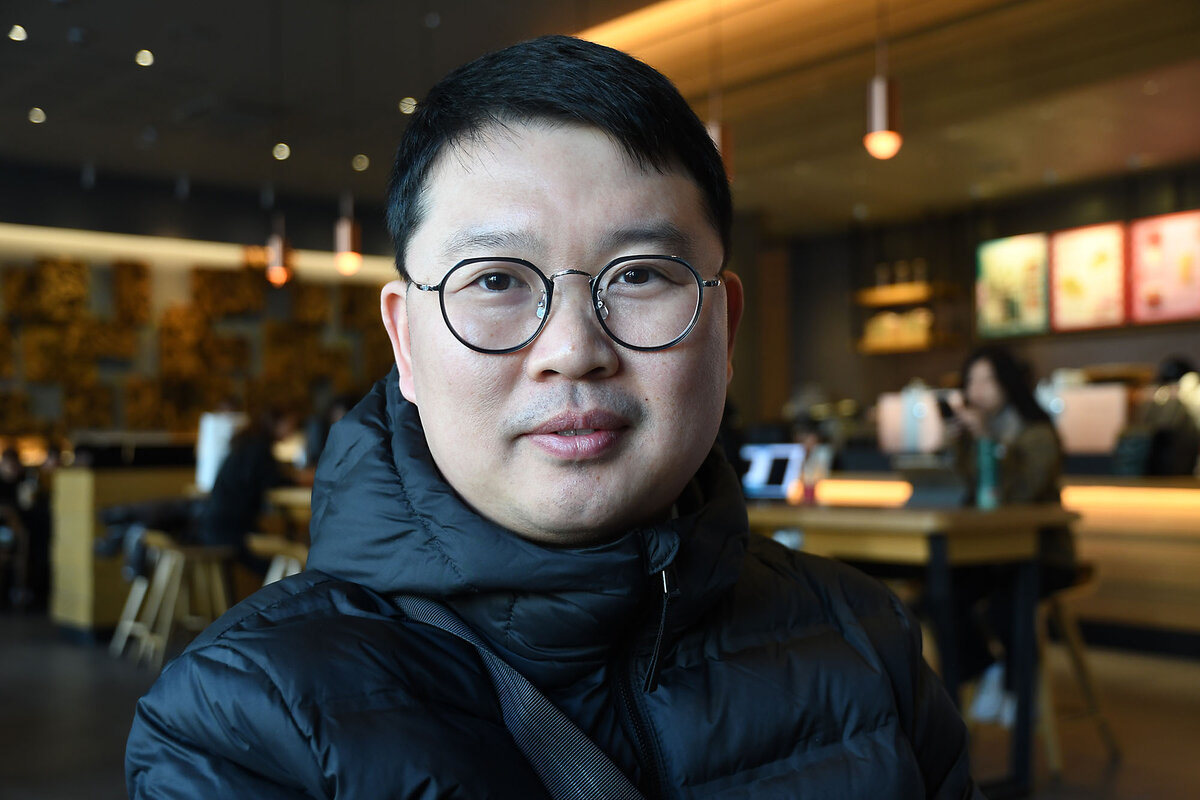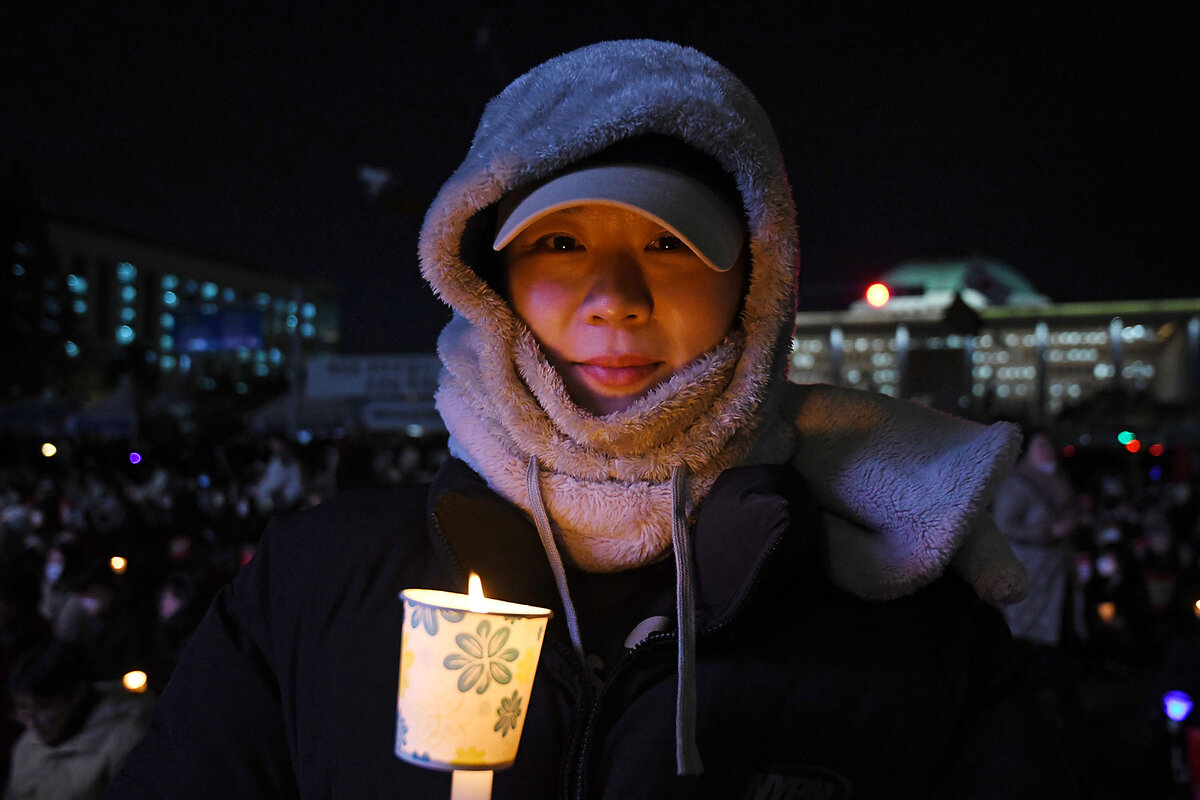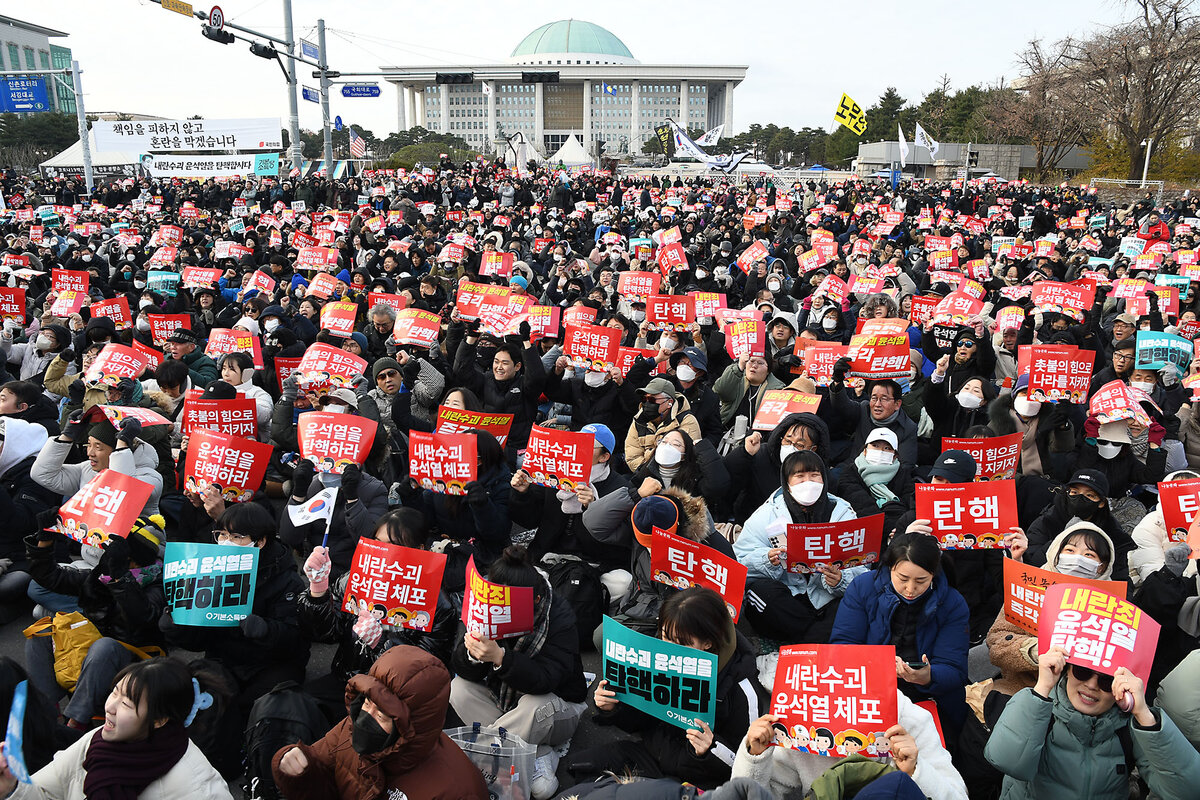They thwarted martial law. But South Koreans say the fight for democracy is not over.
Loading...
| Seoul, South Korea
At Seoul’s traditional Namdaemun market, vendor Jang Chang Suk closely guards her knife-cut noodle recipe – but freely dishes out her views on South Korea’s current political crisis.
“It’s embarrassing,” she says of President Yoon Suk Yeol’s short-lived imposition of martial law Dec. 3, which has plunged the country into turmoil. But Ms. Jang’s dismay is matched by confidence that her fellow citizens will uphold South Korea’s democracy.
“South Koreans are good people. They have it together – they’re on it,” she says, slicing fresh wheat dough with quick strokes of a cleaver and wiping her hands on her flower-print apron. In contrast, she says, “the government is lagging behind.”
Why We Wrote This
South Korea’s relatively young democracy proved its resilience last week when lawmakers shut down the president’s attempt to impose martial law. But he remains in power – at least on paper – revealing the challenges still facing the country.
Indeed, across South Korea, people of all ages have poured into the streets in massive numbers in recent days to send the message that there is no going back to military rule and its dark legacy of repression from the 1980s. Even Mr. Yoon’s backers – less than 20% of South Koreans now, polls show – stress he must protect democratic institutions.
“These incidents tell us that people are internalizing democratic norms,” says Myunghee Lee, an assistant professor at James Madison College of Michigan State University. “The absolute red line is using the military to suppress the opposition. That is not acceptable.”
Still, Dr. Lee, a political scientist focused on East Asia, says the country’s democratic system has a long way to go. While buoyed by their success in drawing that line, many South Koreans are also expressing frustration over political gridlock that preceded the martial law attempt. And the crisis of legitimacy unleashed by Mr. Yoon must still be resolved, with the embattled president surviving an impeachment vote this weekend.
“South Korean democracy is at a ceiling,” she says. So far, “it’s not breaking that ceiling.”
Swift political fallout
In a bustling, concrete-and-glass coffee shop in downtown Seoul, IT professional Je Min Hwang pauses when asked who he’d favor to lead South Korea.
He backs the opposition center-left Democratic Party, but its leader, Lee Jae-myung, is “not 100% clean” either, Mr. Hwang says.
Mr. Lee was convicted last month by a Seoul court for violating election laws, a ruling he says he’ll appeal. An even bigger concern for Mr. Hwang is the polarizing, acrimonious campaign led by Mr. Lee since his party expanded its parliamentary majority in April to discredit Mr. Yoon and his ruling People Power Party (PPP).
“They are butting heads,” Mr. Hwang says of South Korea’s two leading political parties. “There should be compromise.”
The desire for less contentious politics is widespread among South Koreans.
An Jung Min, a clothing importer, says he dislikes both Mr. Lee and Mr. Yoon, and voted for neither of them in the 2022 presidential election, which Mr. Yoon won by a razor-thin margin.
“The current president doesn’t know how to negotiate or collaborate – he’s very stubborn,” says Mr. Min.
As both sides dug in, Mr. Yoon drastically escalated the showdown on Dec. 3 by declaring martial law – banning all political activities and threatening violators with arrest, putting all media under military control, and prohibiting rallies.
Mr. Lee immediately rushed to the National Assembly building – climbing a wall to get in as troops tried to seal off the parliament – and led a vote to oppose military rule. A few hours later, Mr. Yoon backed down and lifted the order.
The public backlash and political fallout have been swift and catastrophic for Mr. Yoon. Last Thursday, then-Defense Minister Kim Jong-Hyun resigned, only to be arrested on Sunday for his role in the martial law decision.
Military commanders distanced themselves from Mr. Yoon, testifying that the martial law attempt was rushed and disorganized, and military veterans – many of whom had supported the president – turned out to condemn him.
South Korea’s stock market hit a one-year low, and its currency slid to a 15-year low against the dollar on Monday, matching the political fortunes of Mr. Yoon, whose popularity rating sank into the teens.
“I voted for the wrong person,” says Seoul taxi driver Mr. Shin, withholding his first name to protect his privacy.
Mr. Yoon’s martial law fiasco shocked him.
“This is not the 1980s – it’s 2024!” he says, referring to the 1980-to-1987 dictatorship of Chun Doo-hwan, who imposed martial law and ordered the brutal crushing of a democratic uprising in May 1980. “In the old days, you could block the media and the roads. But these days, every citizen is a reporter. These days, if a soldier was ordered to shoot civilians, he would disobey.”
On Saturday, facing an impeachment vote by parliament, Mr. Yoon offered a televised apology, followed by a deep bow. But many South Koreans rejected the mea culpa as too little, too late. “It lacked sincerity,” says Mr. Hwang.
President evades impeachment
Ki-Soo Lee, a Seoul kindergarten staff person, was putting her 10-year-old son to bed last Tuesday when the phone rang. A friend frantically told her the president had declared martial law.
“We were all asking, ‘What should we do?’” Ms. Lee recalls. Thoughts raced through her head. Her husband was in the hospital – should she leave her son at home? Overhearing, her son chimed in.
“Umma,” he told her, “under the bed is the best place to hide!”
Ms. Lee says she’s grateful the decree was overturned so quickly, amid large-scale protests. “I believe in the strength of the South Korean people,” she says, clasping her hands together in a sign of solidarity. Now, she says, Mr. Yoon should resign.
“I want the president to realize what he did and step down. If that is not possible, the citizens of South Korea will help him step down,” she says.
The next day, Ms. Lee joined more than 100,000 people from all over South Korea who thronged to the National Assembly to call for impeachment. Chanting and singing, they huddled together, lighting candles as dark descended and it grew bitterly cold. A few hundred Yoon supporters rallied nearby.
As the vote neared, however, Mr. Yoon’s ruling PPP members stood up and filed out – their boycott making the vote impossible. “Go back,” the protesters chanted, calling the boycotting PPP members by name.
Later, in what experts called a highly unorthodox arrangement, PPP leader Han Dong-hoon said the party, together with Prime Minister Han Duck-soo, were taking over responsibility for “state affairs.” Mr. Yoon would no longer be involved in governance or foreign affairs, essentially losing legitimacy while remaining president. On Monday, South Korea’s justice ministry reportedly barred Mr. Yoon from leaving the country.
“The party should not be ruling, because that’s not what the Constitution says,” Dr. Lee says. “This is not great for South Korean democracy.”
Many South Koreans like Park Jung Min believe Mr. Yoon must go. “Our national character is we never give up,” says Ms. Park, a shipping company worker from the southern city of Geoje who traveled by bus for five hours to come to Saturday’s rally – her first political protest.
“It’s in our instinct and our blood,” she says. “I will come back [to protest] next week.”












